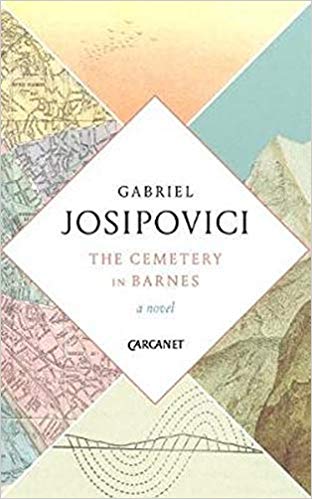 One might most fittingly describe this novel as entranced, enchanted, trance-like. As in Alain Resnais’s 1961 film Last Year in Marienbad, there is a deceptive stillness over everything, as we obsessively revisit certain phrases, images, personages in an ever-tightening pursuit of an elusive truth.
One might most fittingly describe this novel as entranced, enchanted, trance-like. As in Alain Resnais’s 1961 film Last Year in Marienbad, there is a deceptive stillness over everything, as we obsessively revisit certain phrases, images, personages in an ever-tightening pursuit of an elusive truth.
The Cemetery in Barnes focuses on an unnamed protagonist, a translator who dwells recursively on three specific periods in his life: in Carlton Drive, Putney, with his first wife (in a flat in a two-storey Victorian house, the text informs us, though interestingly if you look at Carlton Drive on Google Maps you’ll see it’s mainly post-war apartment blocks with a scattering of three- and four-storey Victorian villas. The only two-storey Victorians are in the walk-through between Carlton Drive and East Putney station, Earnshaw Place. Yeah, this book really rubbed off on me…) in Paris, where he lived and worked for some years after the death of that first wife, and the farmhouse in the hills above Abergavenny, where he lived and threw convivial dinner parties with his second wife. Whilst recalling these places and people, the translator grapples with the intractability of certain issues of translation – Italian to English (Striggio’s libretto for Monteverdi’s Orfeo), antique French to English (du Bellay’s Regrets), English to French (Shakespeare’s Venus and Adonis). An unassuming man, with few material needs. An otherworldly man, above all a self-absorbed man. A harmless man? Perhaps, perhaps not…
Josipovici’s novel is essentially a twisted retelling of Orpheus and Euridice. The protagonist’s first wife dies by drowning, the second by fire, both plunge ‘into hell’. In both cases, the protagonist – this botched Orfeo – is unable or unwilling to save them. What are initially presented as relationships of unswerving devotion gradually reveal aspects of themselves that do not fit. Was the first wife having an affair with ‘the bearded maths teacher, Frederick Aspinall’? How companionable is the continuous ‘banter’ between the protagonist and his second wife, and was this wife similarly being unfaithful with ‘the retired civil servant’, Wilfred?
It is interesting to note that the only people ever named in this novel are Frederick Aspinall, the retired civil servant Wilfred and his wife, the ‘horse-faced’ Mabel – a fact that strongly suggests these people are seminal, important. Is the protagonist actually a murderer? A double murderer? In the cases of both wives, we are offered alternative visions of what actually happened to them: the first wife slips down the river embankment in Putney but is able to scramble out of the water further down. She later dies, we assume, of pneumonia contracted through her immersion in the Thames. The first wife slips down the embankment, plunging into the water to disappear immediately and permanently from our sight. The police question the protagonist about why he didn’t make any attempt to save her, and by the way, does he need a lawyer?
In the Brecon Beacons, the protagonist and his second wife watch as firefighters try to extinguish a blaze that is consuming a barn. The blaze burns out of control and the firemen are ordered to retreat. In the Brecon Beacons, the protagonist watches the farmhouse he shared with his second wife burn to the ground, unable to believe the ‘charred bodies’ he is shown were once people.
Indeed, the protagonist’s only quantifiable reality resides in words, the intricacies of language, the effect and difficulties of rendering one language into another. We have no idea if our translator truly ‘regrets’ anything – everything we learn about him sounds false or questionable to a degree, and we are reminded that the French words for translation and betrayal sit uncomfortably close together. An insistent reference to Emily Dickinson’s poem A Narrow Fellow in the Grass earlier on in the text comes back to haunt us – a snake in the grass, then, who is the narrow fellow?
I also could not refrain from asking myself: was this man ever actually married to either of these women or were they just a stalker’s fantasies? Read, read between the lines, see what you think. Whatever you come to believe, the stalker theory is certainly a possibility. Beloved horrors, indeed. Well might our traducer dwell upon them. A further oddity I kept dwelling on was how persistently this novel brought to mind the equally beguiling and disturbing book The Life Writer, by David Constantine, also a translator…
Josipovici’s use of language and metaphor is as close to perfect as any writer might dare to imagine: unadorned, understated to the point of nihilistic, clear and limpid as a mountain stream, coursing invisibly through a cleft in the Black Mountains above Abergavenny. No extraneous words and few adjectives, the repetition of certain phrases and images take on the affect and mechanism of poetry. And so meaning is fashioned.
This is the kind of novel often referred to by detractors as ‘plotless’. It numbers fewer than a hundred pages. Just sit with it awhile, let it reveal itself. Once revealed, it is unforgettable, and a masterpiece.